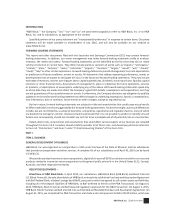HR Block 2016 Annual Report Download - page 19
Download and view the complete annual report
Please find page 19 of the 2016 HR Block annual report below. You can navigate through the pages in the report by either clicking on the pages listed below, or by using the keyword search tool below to find specific information within the annual report.
H&R Block, Inc. | 2016 Form 10-K 11
The occurrence of any systems or internet failure, or business interruption could negatively impact our ability to
serve our clients, which in turn could have a material adverse effect on our business and our consolidated financial
position, results of operations, and cash flows.
Government initiatives that modify tax return preparation requirements or expedite refunds could have an adverse
effect on our business and our consolidated financial position, results of operations, and cash flows.
From time to time, there are various initiatives seeking to modify the preparation and filing of federal tax returns,
including preparation of tax returns directly by the IRS, and to provide additional assistance with respect to preparing
and filing such tax returns or expediting refunds. H&R Block is a member of the FFA, which provides the ability for
low-income taxpayers to prepare and file their own federal tax returns online for free. The IRS has been exploring the
Real Time Tax System concept, which would require that documents (such as W-2s and 1099s) must be on file with
the IRS prior to taxpayers submitting their tax returns. The objective of this concept would be to facilitate document
matching such that it would reduce fraud and after-the-fact audits. The implementation of the Real Time Tax System
would provide a foundation for the IRS preparation of tax returns and make the pre-populated return a more tangible
possibility.
The IRS has in the past explored the possibility of allowing taxpayers to allocate a portion of their tax refunds to
pay tax preparation fees, which could reduce the demand for RTs, but the IRS has not advanced this initiative. Taxing
authorities in various state, local, and foreign jurisdictions in which we operate have also introduced measures seeking
to modify the preparation and filing of tax returns in their respective jurisdictions. The adoption or expansion of any
measures that significantly modify tax return preparation, expedite refunds, or otherwise reduce the need for a third-
party tax return preparer could reduce demand for our services and products and could have a material adverse effect
on our business and our consolidated financial position, results of operations and cash flows.
The Dodd-Frank Act created the CFPB to administer and, in some cases, enforce U.S. federal financial consumer
protection laws and expanded the role of state regulators with respect to consumer protection laws. Regulations
promulgated by the CFPB or state regulators may affect our financial services businesses in ways we cannot predict,
which may require changes to our financial products, services, and contracts.
The Dodd-Frank Act created the CFPB and gave it broad powers to administer, investigate compliance with, and, in
some cases, enforce U.S. federal financial consumer protection laws. The CFPB has broad rule-making authority for a
wide range of financial consumer protection laws that apply to all banks, federal savings banks, and other financial
services companies, including the authority to prohibit "unfair, deceptive, or abusive" acts and practices.
The CFPB may examine, investigate, and take enforcement actions against our subsidiaries that provide consumer
financial services and products, as well as financial institutions and service providers upon which our subsidiaries rely
to provide consumer financial services and products. The Dodd-Frank Act also expanded the role of state regulators
in enforcing and promulgating financial consumer protection laws, the results of which could be states issuing new
and broader financial consumer protection laws, some of which could be more comprehensive than existing U.S.
federal regulations. New CFPB and state regulations may require changes to our financial products, services and
contracts, and this could have a material adverse effect on our business and our consolidated financial position, results
of operations, and cash flows. Examples of recent CFPB action include the following:
On November 13, 2014, the CFPB issued proposed rules that would change the regulation of prepaid products.
It is not clear when the CFPB will publish the final version of these rules, or what their content will be. If
enacted as proposed, the rules would make prepaid cards subject to Federal Reserve Regulations E and Z,
among other things, and would apply to the H&R Block Emerald Prepaid MasterCard®. It is possible that,
depending on the form of the final rules, changes would be necessary to the H&R Block Emerald Prepaid
MasterCard® to comply with the final rules, and that such changes could have a material adverse effect on
the revenue we derive from our H&R Block Emerald Prepaid MasterCard® program.
On May 5, 2016, the CFPB issued a request for comments on its proposal to prohibit mandatory consumer
arbitration clauses in consumer financial product contracts. We, and certain of our third party service
providers, utilize consumer arbitration clauses in connection with all of our consumer financial services
products. It is not clear when the CFPB will publish the final version of these rules, or what their content will
be. It is possible that, if the CFPB issues final rules that prohibit our use of consumer arbitration clauses, the
risk of litigation involving our consumer financial products could increase, and the revenue that we derive
























